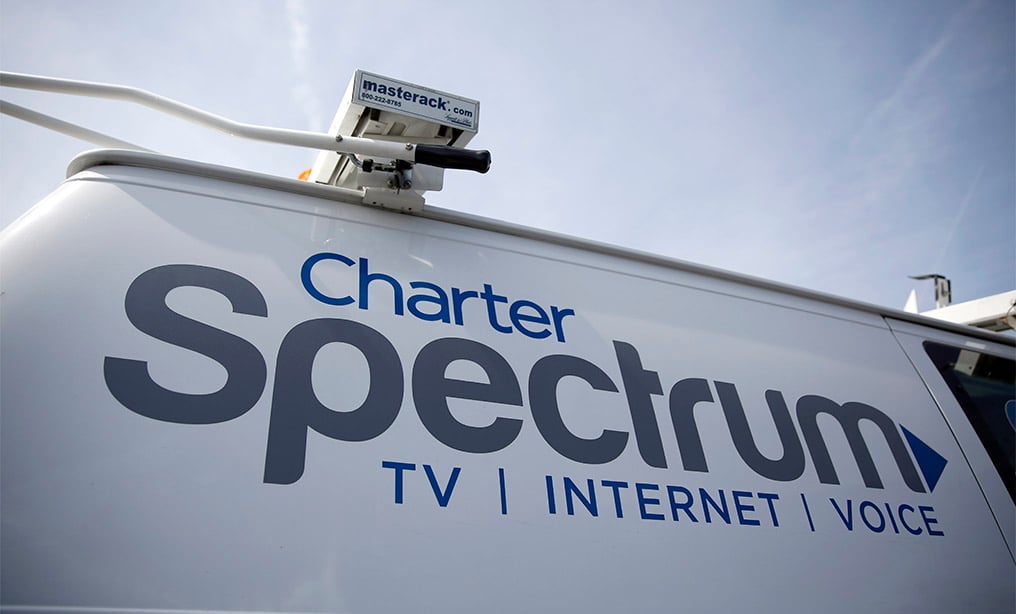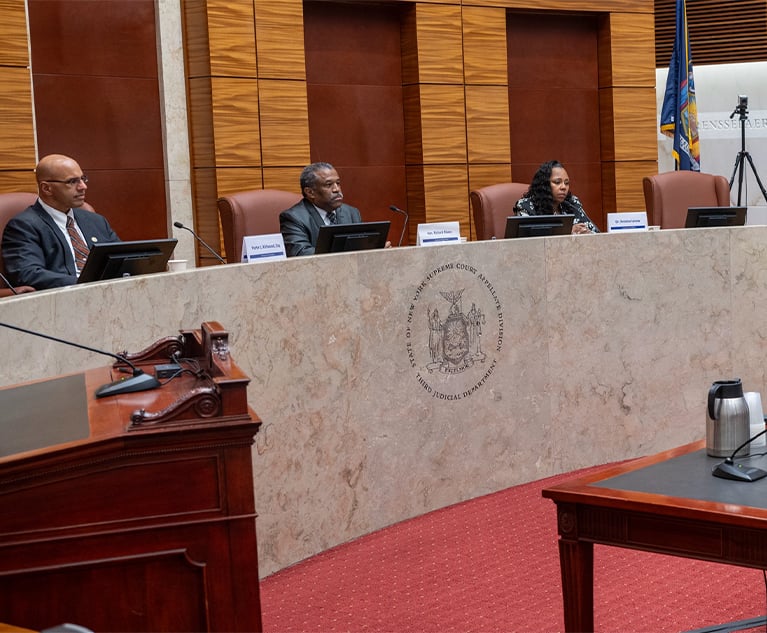Charter Loses Bid to File 3rd Complaint Over Union Contract Row
The cable company wanted to argue an attempt for new contract language related to the payment and benefits of subcontractors was unlawful, but U.S. District Judge Paul Gardephe ruled that the effort would be futile.
September 19, 2018 at 05:59 PM
4 minute read
 Photo: Jeff Roberson/AP
Photo: Jeff Roberson/AP
Amid its ongoing labor dispute with Local Union 3 IBEW electricians, cable company Charter Communications was denied the ability to file a revised third amended complaint in federal court over what it says were illegal demands during contract negotiations in 2017.
In an order issued Wednesday, U.S. District Judge Paul Gardephe of the Southern District of New York traced what the court found to be the cable company's lack of diligence in bringing the case. Gardephe, a year ago, dismissed Charter's second shot at a complaint, finding no plausible allegation the union insisted on an unlawful signatory clause.
In its latest proposed claims, filed in November 2017, Charter alleges claims under the Labor Management Relations Act born out of a proposal made by the union in March 2017 during contract negotiations. The union sought to change language related to Charter's future hiring of subcontractors.
Under the old language, the subcontractors were to be paid wages and benefits similar to those under Local Union 3's contract with Charter. The union wanted a new contract to stipulate that those wages and benefits would be identical to those it negotiated.
Charter argued that because of the nature of the union's benefits structure, providing identical benefits would effectively corner it into only doing business with contractors who are party to a collective bargaining agreement with the union. This would be a violation of labor laws that prevent unions from dictating a company's dealings with third parties. Striking, the cable company argued, amounts to an unfair labor practice aimed at forcing the company to accept an unlawful demand.
As the court noted in a footnote, the cable company's prospects in the case were slim. Just days after the negotiations at the center of its claims, Charter was presented with expanded language by the union which, Gardephe notes, is not contended to be an unlawful union signatory clause. Damages, then, would be limited to all of three days between proposals when the union was on strike.
Still, in reviewing Charter's proposed claims, Gardephe found that courts and the National Labor Relations Board look for explicit language that would force a subcontractor to adhere to the terms of the union's contract for there to be an unlawful secondary effect. As the court saw no such explicit language proposed by the union, Charter's claims were found to be futile, and its motion to file denied.
“While plaintiff highlights the Union's demand that subcontracting be limited 'to companies paying wages and benefits identical to [the] [collective bargaining agreement]' … both courts and the NLRB have approved clauses requiring employers to select subcontractors that pay 'the same' wages and benefits,” Gardephe wrote.
The judge also noted that Charter failed to cite specific laws to support its claims the union's proposal was unlawful. What it did cite, Gardephe said, focused solely on language limiting subcontracting to contractors who were signatories to the CBAs.
The union and individual officers named were represented by Archer, Byington, Glennon & Levine name attorney John Byington III. In a statement, Byington noted that the union had yet again prevailed against Charter in the matter.
“Judge Gardephe's thorough and well-reasoned decision correctly found again, after multiple attempts by Charter Communications to persuade the court otherwise, that the union complied with applicable law in its good faith attempts to negotiate a fair contract for Charter/Spectrum's employees, and while faced with an uphill battle to secure a fair contract which is still unresolved,” Byington said.
Charter was represented by a legal team led by Kauff McGuire & Margolis name attorney Kenneth Margolis. He did not respond to a request for comment.
Related:
2nd Circuit Reaffirms CBA Law, Nods to Sister Circuits in Upholding NLRB Order
Justices, Overturning Precedent, Restrict Labor Union Power to Collect Fees
This content has been archived. It is available through our partners, LexisNexis® and Bloomberg Law.
To view this content, please continue to their sites.
Not a Lexis Subscriber?
Subscribe Now
Not a Bloomberg Law Subscriber?
Subscribe Now
NOT FOR REPRINT
© 2025 ALM Global, LLC, All Rights Reserved. Request academic re-use from www.copyright.com. All other uses, submit a request to [email protected]. For more information visit Asset & Logo Licensing.
You Might Like
View All

Law Firms Expand Scope of Immigration Expertise Amid Blitz of Trump Orders
6 minute read
'Reluctant to Trust'?: NY Courts Continue to Grapple With Complexities of Jury Diversity
Trending Stories
Who Got The Work
J. Brugh Lower of Gibbons has entered an appearance for industrial equipment supplier Devco Corporation in a pending trademark infringement lawsuit. The suit, accusing the defendant of selling knock-off Graco products, was filed Dec. 18 in New Jersey District Court by Rivkin Radler on behalf of Graco Inc. and Graco Minnesota. The case, assigned to U.S. District Judge Zahid N. Quraishi, is 3:24-cv-11294, Graco Inc. et al v. Devco Corporation.
Who Got The Work
Rebecca Maller-Stein and Kent A. Yalowitz of Arnold & Porter Kaye Scholer have entered their appearances for Hanaco Venture Capital and its executives, Lior Prosor and David Frankel, in a pending securities lawsuit. The action, filed on Dec. 24 in New York Southern District Court by Zell, Aron & Co. on behalf of Goldeneye Advisors, accuses the defendants of negligently and fraudulently managing the plaintiff's $1 million investment. The case, assigned to U.S. District Judge Vernon S. Broderick, is 1:24-cv-09918, Goldeneye Advisors, LLC v. Hanaco Venture Capital, Ltd. et al.
Who Got The Work
Attorneys from A&O Shearman has stepped in as defense counsel for Toronto-Dominion Bank and other defendants in a pending securities class action. The suit, filed Dec. 11 in New York Southern District Court by Bleichmar Fonti & Auld, accuses the defendants of concealing the bank's 'pervasive' deficiencies in regards to its compliance with the Bank Secrecy Act and the quality of its anti-money laundering controls. The case, assigned to U.S. District Judge Arun Subramanian, is 1:24-cv-09445, Gonzalez v. The Toronto-Dominion Bank et al.
Who Got The Work
Crown Castle International, a Pennsylvania company providing shared communications infrastructure, has turned to Luke D. Wolf of Gordon Rees Scully Mansukhani to fend off a pending breach-of-contract lawsuit. The court action, filed Nov. 25 in Michigan Eastern District Court by Hooper Hathaway PC on behalf of The Town Residences LLC, accuses Crown Castle of failing to transfer approximately $30,000 in utility payments from T-Mobile in breach of a roof-top lease and assignment agreement. The case, assigned to U.S. District Judge Susan K. Declercq, is 2:24-cv-13131, The Town Residences LLC v. T-Mobile US, Inc. et al.
Who Got The Work
Wilfred P. Coronato and Daniel M. Schwartz of McCarter & English have stepped in as defense counsel to Electrolux Home Products Inc. in a pending product liability lawsuit. The court action, filed Nov. 26 in New York Eastern District Court by Poulos Lopiccolo PC and Nagel Rice LLP on behalf of David Stern, alleges that the defendant's refrigerators’ drawers and shelving repeatedly break and fall apart within months after purchase. The case, assigned to U.S. District Judge Joan M. Azrack, is 2:24-cv-08204, Stern v. Electrolux Home Products, Inc.
Featured Firms
Law Offices of Gary Martin Hays & Associates, P.C.
(470) 294-1674
Law Offices of Mark E. Salomone
(857) 444-6468
Smith & Hassler
(713) 739-1250







